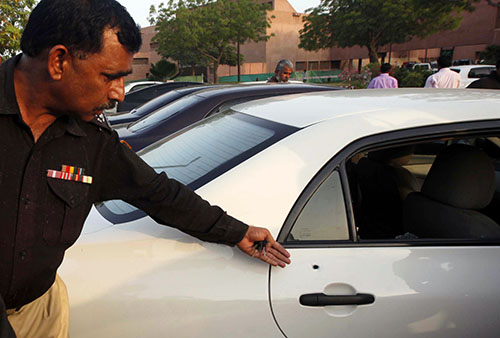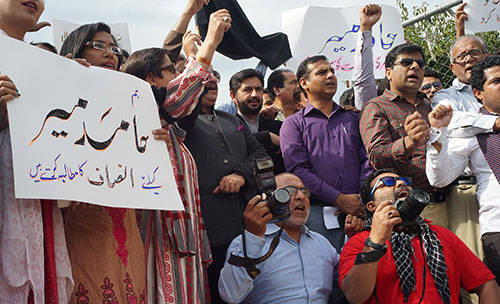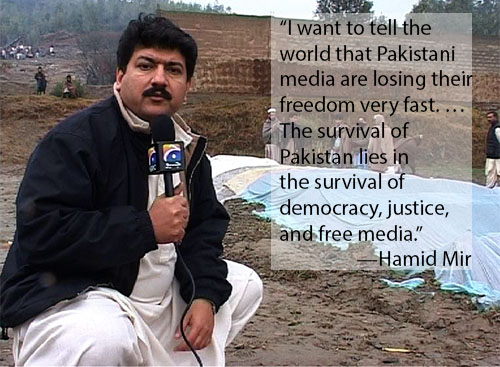Hamid Mir and I last saw each other in Islamabad in late January at a meeting of the Pakistan Coalition on Media Safety. Mir, a senior anchor for Geo News, seemed as if he was on the road to recovery, but he was obviously still in pain from injuries he sustained during an assassination attempt on him last year. On April 19, 2014, Mir was shot multiple times as he left Karachi’s main airport.
The month before the attack on Mir, CPJ met with Prime Minister Nawaz Sharif in Pakistan and discussed concerns about the deteriorating climate for press freedom in the country. In the March 2014 meeting, Sharif pledged to address media freedom with meaningful action and made a series of commitments, including the creation of a joint government-media commission to address attacks on the press. There has been little progress in meeting any of those commitments.
And just days after CPJ’s meeting with Sharif, gunmen fired on the car of Express TV anchor Raza Rumi. Rumi survived, but his driver, Mustafa, died. There have been a few arrests in the attack, but not of the mastermind. The attack on Rumi was the fourth on the Express Group in eight months.
These attacks on journalists should be seen in the context of the violence that has swirled around the Pakistani press for years–and which seemed to reach greater heights in 2014. In August that year, I did a Q&A with Mir about the climate for press freedom in the months following the attack on him. In November, he wrote to me saying he was still under threat. Earlier this month, I did another interview with him, in which he told me that the Pakistani media was losing its freedom.
This interview has been edited for clarity.
CPJ: First things first, Hamid. How is your health?
HM: I was attacked on April 19, 2014. I spent three months in bed with six bullet injuries. Two bullets are still inside my body–one in the belly and one in my right thigh.

Doctors asked me to rest for at least six months, but I came back to work in August 2014 because my organization was going through a big crisis. The survival of Geo Television was in danger. Powerful security agencies wanted to shut it down. They used banned outfits like LeT [militant group Lashkar-e-Taiba] and JuD [Jamaat-ud-Dawa, LeT’s political arm] to terrorize us. They forced cable operators to take Geo News off air. They forced advertisers not to give business to Geo News. My colleagues were threatened. Many of them left Geo Television. I was in a wheelchair when I came back to work.
It was not only Geo Television but democracy in Pakistan that was also facing danger in those days. Some opposition leaders and TV channels were inviting the army to take [control of the government]. In July 2014, I went to London for medical treatment, and some anti-democracy TV channels said Hamid Mir had run away from Pakistan. I immediately came back to Pakistan and started working, without completing my medical treatment. Now I am much better. I can walk without a stick, but I still feel pain in my legs and right shoulder. I still need some rest and medication.
CPJ: Has there been any progress in investigating the assassination attempt on you?
HM: Unfortunately, there has been no progress yet. I appeared in front of an inquiry commission three times and spent hours with them. They were supposed to give their report in three weeks, but one year has passed. Last month, Prime Minister Nawaz Sharif asked me, “What happened to the inquiry about the assassination attempt on you?” I smiled and said I didn’t know.
I think the attack on my life was part of a bigger plan. Somebody attacked me just to silence the media and wanted to overthrow the elected government. Free media and democracy definitely weakened in the last one month, but they have survived and I am hopeful that one day the culprits will be exposed. Some police officials told me that a security agency tried to involve the MQM [the Muttahida Qaumi Movement political party] in my case but that they lacked credible evidence.
CPJ: While you were still hospitalized, Prime Minister Nawaz Sharif established a three-member judicial commission which was supposed to release its report on the attack within three weeks. In my experience, such commissions take the pressure off the police to do their job of investigating, prosecutors for prosecuting, and courts from hearing such cases and handing down verdicts. Admittedly, the civilian authorities have a terrible track record in doing their job, but do you think the special inquiry into your case had any value? Were there any other ramifications?
HM: I agree with you that inquiry commissions never produced good results at least in Pakistan, but my case was different. [After] the prime minister visited me in hospital and announced the inquiry, there was an unannounced coup against his government. Powerful security agencies used banned outfits not only against Geo Television but also against the elected government. Some people forced me to leave Pakistan in those days, but I decided to give my written affidavit to inquiry commission. My affidavit became part of the Supreme Court record.
My organization was fighting a battle for survival, so they never focused on the commission’s inquiry, but a mysterious silence of the commission is actually a vindication of my stance. I never held ISI [Inter-Services Intelligence] responsible as an institution for attacking me, but I named some officials of the agency with evidence and told the commission that they wanted to bargain with me on certain issues. When I refused to make compromises on my professional ethics, they attacked me. If I was wrong, why have they never proved me wrong?
CPJ: Following the attack on you, Geo News came under a tremendous amount of legal and commercial pressure. How’s Geo faring these days?
HM: Geo is still facing pressure and threats. Cable operators were summoned to the office of an intelligence agency in Karachi recently, and they were asked not to show Geo. Courts have given orders in our favor, but the government is not in a position to implement them because intelligence agencies are more powerful than the elected government. Geo is facing huge financial pressures. We regained our viewership very fast–that was why some elements within an intelligence agency acted openly and nakedly against Geo in the biggest city, just to harm our ratings.
Frankly speaking, Geo is no more an independent news channel. It is no longer exposing human rights violations in Baluchistan aggressively. It is no longer criticizing the past political role of some army generals in politics. I am also facing many restrictions, but I accepted these for the time being because my organization is fighting for its survival. It will be difficult for me to accept these sorts of restrictions for a long time.

CPJ: As we watched events unfold from New York, it looked like there wasn’t a united response from the broadcast industry in condemning the attack, especially when it became clear that Geo had angered the intelligence and security services with its coverage of the assassination attempt on you and the aftermath. I’ve always felt Pakistan’s journalists have exhibited a great deal of solidarity, but that has seldom been the case with the media houses and their management and owners. Do I have that right? Have things gotten better between competing media houses? If not, how can that be addressed?
HM: I am lucky that working journalists stood by me because they knew I was fighting for their freedom and safety. I am lucky that all important political parties and civil rights organizations supported me because they knew I was fighting for democracy. Provincial assemblies of Baluchistan and Sindh adopted resolutions in my support because I was fighting for the rights of smaller provinces.
Yes, some TV channels attacked me and my channel under the pressure of powerful spy masters. Some TV anchors made baseless allegations against me and privately said sorry to me. They said, “We are sorry because we were under pressure. We cannot take six bullets like you.” Those who attacked me also attacked democracy. Now they are exposed. The response of the media after the attack on me actually exposed the reality of many TV anchors and columnists. Interestingly, print media were more supportive of me than electronic media. The reason was obvious: Print media are more mature than electronic media.
CPJ: Last November, after exchanging emails with you, I quoted you saying: “I am very careful these days in TV shows, but even then I am getting threatening messages and facing another hate campaign.” Are you still under threat?
HM: I am still under threat. I am using a bulletproof vehicle these days and move with private guards. As I told you earlier, I am not touching some sensitive issues these days, but I cannot avoid these issues for a long time.
CPJ: Our job is to protect journalists, so we focus on attacks like those against you and your colleagues. But these attacks take place in a country where the government isn’t even able to ensure the security of the general population. According to Al-Jazeera, since July 2012, at least 66 people have been killed in attacks on polio vaccination teams across Pakistan. That’s a higher death rate than journalists face. What is the best way to protect journalists in a security climate like that?
HM: Journalists are facing threats not only from powerful security agencies but also from those who are attacking the polio workers. We receive SMS messages and telephone calls from extremists, and then we think: Why is no one arresting them? We are in the crossfire, and that’s why we need legislation for journalists’ safety. We have contacted parliamentarians from the government and the opposition to introduce legislation for the safety of journalists. Unfortunately, many owners of TV channels are not interested in the safety of their staff but working journalists are trying their best for journalists’ safety legislation.
CPJ: CPJ and others encourage safety training and protective gear for the people in the field working in dangerous situations–sure. Training for editorial managers not to push their crews too hard to compete in high-risk situations–definitely. A while back, there was a general agreement between broadcasters about how to reduce risk but still compete in live broadcast situations, something we encourage. But how do you protect people from assassination attempts like those aimed at you and Raza Rumi? How do you protect a reporter in Baluchistan or the Federally Administered Tribal Areas from execution by a rival separatist group or a government agency? That’s how 32 journalists have died for their work in Pakistan since 1992: They were directly targeted.
HM: This problem is linked with the independence of the judiciary and parliament. Journalists are not secure because courts and parliament are not strong enough. Only an independent judiciary and a strong parliament can guarantee the freedom of media. We have to fight for a strong judiciary and parliament if we want free media. Security agencies should be answerable to the elected parliament and then attacks on media will come down.
CPJ: Hamid, what are your plans for the future?
HM: I have been going through pressures, threats, and attacks since 2007 when [former President Pervez] Musharraf banned me on TV. I survived because my viewers and readers were my biggest strength. I am thankful for their support, but now I am facing difficulties in handling rising threats. I met Prime Minister Nawaz Sharif recently and informed him about the problems I am still facing.
If things will not improve, I will leave my job as an anchor and I will write a book about the events that took place in the past one year. I cannot hide the truth from the public for so long. I can expose truth only after leaving my job. I know it will create more problems for me, but I will not surrender. I will fight till the last drop of my blood.
CPJ: And, finally, any points you want to raise that I haven’t touched on?
HM: I want to tell the world that Pakistani media are losing their freedom very fast. Losing freedom means losing credibility. The survival of Pakistan lies in the survival of democracy, justice, and free media. If media will lose their freedom, then there will be no democracy and if there will be no democracy it will be difficult for the state of Pakistan to survive.
